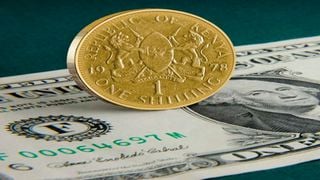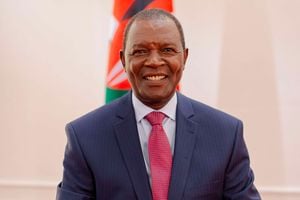
With still over three months to the end of 2023, the shilling has nearly doubled its losses against the US dollar.
| ShutterstockBusiness
Premium
Shilling falls further against major world currencies
With still over three months to the end of 2023, the local exchange rate has nearly doubled its losses against the US dollar from the entirety of last year even as it marks deeper losses against other major world currencies including the British Pound and the Euro.
For the second year running, the Shilling has been on a free fall, shedding nearly 30 per cent of its value against the green buck since the start of 2022.
Put in nominal terms, the depreciation has been staggering with the Shilling today changing hands for the dollar at Sh 146.65- the official rate by the Central Bank of Kenya (CBK) against Sh113.14 at the start of January last year.
According to analysts the local unit has given in to pressure arising from a multitude of factors which have turned up the heat on all burners.
With supply chain constraints raging in recent years, which have given rise to higher import costs, foreign investor apathy which has turned off the taps of foreign exchange inflows and higher external debt service costs depleting the country’s reserves, the weakening of the local unit has come as no surprise.
“The Shilling has been engulfed by pressure from all sides from rising import costs, diminishing foreign reserves and portfolio outflows which have hit out at key accounts- the current, capital and financial accounts. The Shilling has tried to absorb the pressure best it can but has caved in with the depleted accounts signaling looming shortages of hard currency to set off panic in the market demonstrated by dollar hoarding and excessive speculation,” Ronny Chokaa, a research analyst at Genghis Capital told the Nation.
For Kenyans, this has meant difficulties in sourcing for dollars as volatility in the exchange rates gives rise to hoarding as many purchase dollars even in instances where there is no need for hard currency.
Import costs have likewise soared ranging from the cost of used cars sourced from overseas markets such as Japan, as has petroleum costs which are usually denominated in dollars.
While the depreciation of the local unit has happened right under the nose of the CBK, the apex bank has kept a hands-off stance by limiting interventions which would in effect prop up the local unit.
The nonchalant response by the CBK has partly been on the guidance of the International Monetary Fund (IMF) who have prodded the government to let the local unit act as a shock absorber amidst multiple shocks.
By taking a non-intervention stance, the CBK has for instance paused the deployment of forex reserves to defend the local unit, helping preserve the emergency cover.
“The authorities are committed to allowing exchange rate flexibility and supporting official reserves. Real exchange rate depreciation would help mitigate some of the balance of payments pressures and support reserves,” the IMF stated in a recent report.
Additionally, by keeping its foot off the brakes, the CBK has in effect allowed the local unit to find new trading levels serving to address years’ long concerns of the unit’s overvaluation.
In July, CBK Governor Kamau Thugge indicated the apex bank had largely stepped off interventions in the foreign exchange market with the interludes often also involving the mop up of the Shilling from the money markets.
“We of course pursue a flexible exchange rate system and sometimes intervene, although we have not been intervening as much lately,” he indicated.
The depreciation of the local unit is expected to ease off once the local unit achieves fair value parity correcting from years’ long mispricing.
Analysts have already preempted a slower depreciation of the local unit but would still expect the Shilling to lose further ground from current levels.
“We think further weakness is warranted considering the wide current account deficit, thin levels of FX buffers and global monetary tightening,” lead economist at EFG Hermes Abu Basha stated.
CBK has nevertheless initiated policies to improve the availability of hard currency in the money markets including the reopening of the interbank foreign exchange market.





